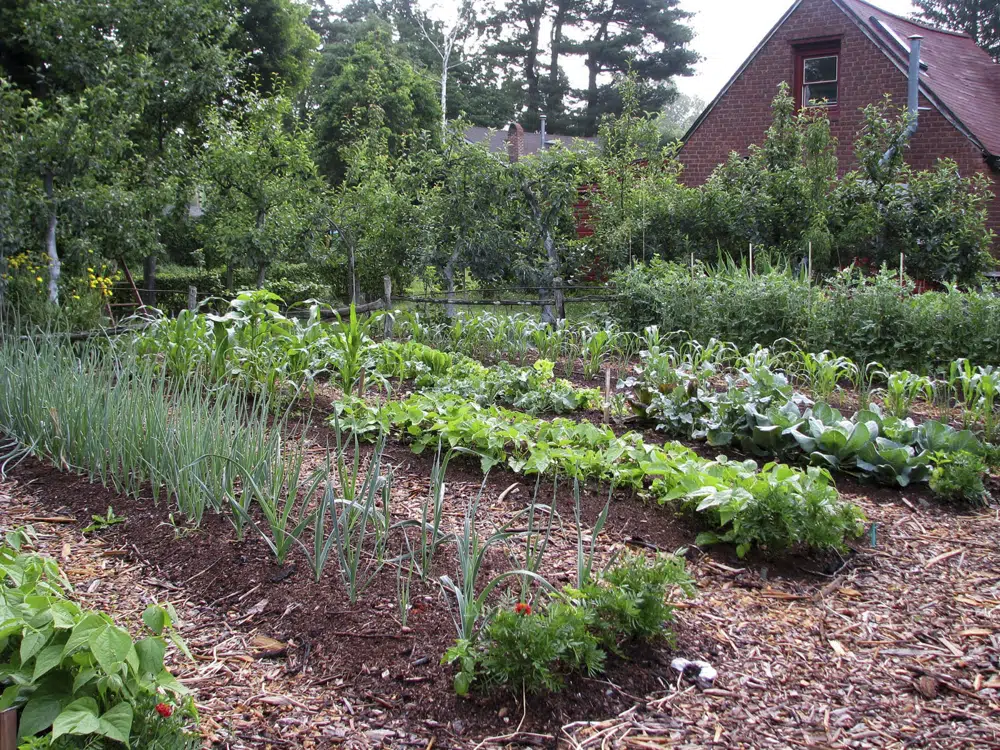FILE – This undated photo shows beds in a weedless vegetable garden in New Paltz, N.Y. Smoke from hundreds of wildfires burning in Canada has affected air quality across vast swaths of the U.S. East and Midwest, which might have some effect on garden plants if the exposure is prolonged. (AP Photo/Lee Reich, File)
Smoke from hundreds of wildfires burning in Canada drove down air quality across swaths of the Eastern U.S. this week, a problem all too familiar in many Western states. In the New York City suburbs where I live, the air became smoggy and orange, categorized for a time by monitoring agencies as “hazardous.”
During the worst of it, I wore a mask inside my house and kept my dog mostly indoors.
But my plants stood in the garden with no choice but to breathe the toxic air through the tiny pores in their leaves.
If your area is heavily affected by smoke or ash, the first priorities should, of course, be human, home and pet safety. But after securing those, you might find your plants need a little help, too.
“When they’re exposed to smoke particles for a short amount of time, plants will bounce back, but a heavy amount of smoke is different than a passing event,” according to Oregon State University Extension community horticulturist Brooke Edmunds, who also is a plant pathologist.
“It depends on how close you are,” she said. “There also could be a localized effect, where one garden is covered in ash, and a half-mile away, there’s nothing because that’s the way the wind was moving things around.”
Pollutants and small particulate matter landing on your plants can block sunlight, which is essential for photosynthesis. Reduced photosynthesis translates to reduced energy, and weaker plants will display slow growth and diminished vigor.
Additionally, with prolonged exposure, volatile organic compounds found in smoke can affect leaves and other plant parts and disrupt the ability of plants to take up nutrients. The damage, if any, won’t be noticeable right away.
The best thing home gardeners can do is “keep an eye on plants for the rest of the summer and give them TLC because these events can add to the general stress of plants,” Edmunds advised, adding that “most will pull through.”
Wash smoke residue off plants with a gentle spray from a hose, then give them a long, slow drink to help rehydrate them. Don’t fertilize until the air clears and plants fully recover.
If there are ashes, Edmunds cautions against using a leaf blower to remove them, which would raise the risk of inhalation.
“Always protect yourself as the gardener,” she said.
Ash deposits can affect soil chemistry, raising pH levels and diminishing the availability of nutrients to some plants, particularly those requiring acidic growing conditions. If you find more than a dusting of ashes in your garden after a wildfire, bring a soil sample to your local extension service for testing and advice.
And if you live in a region prone to wildfires, plant less-vulnerable species that will better withstand future exposures. Native plants tend to be more resilient than exotics. Your extension service, botanical garden or horticultural society can offer guidance for selecting appropriate plants for your area.
“A lot of times, people are concerned about edible plants, but smoke doesn’t actually penetrate into fruits or vegetables,” Edmunds said. If there’s a coating of ash on them, she advises washing them with a solution of 1 part vinegar and 9 parts water, or peeling them.
“It’s really early in the season, though, so there won’t likely be any issues,” Edmunds said.
___
Got questions about spring gardening? Please send them to Jessica Damiano at jessica@jessicadamiano.com with “Gardening Question” in the subject line. She’ll answer selected questions in a future AP gardening column. Damiano writes regular gardening columns for the AP and publishes the award-winning Weekly Dirt Newsletter. You can sign up here for weekly gardening tips and advice.
Copyright 2021 Associated Press. All rights reserved.
Source: https://apnews.com/article/garden-plants-smoke-protection-935d603a69a4d34f875aec224d44c8ed










































